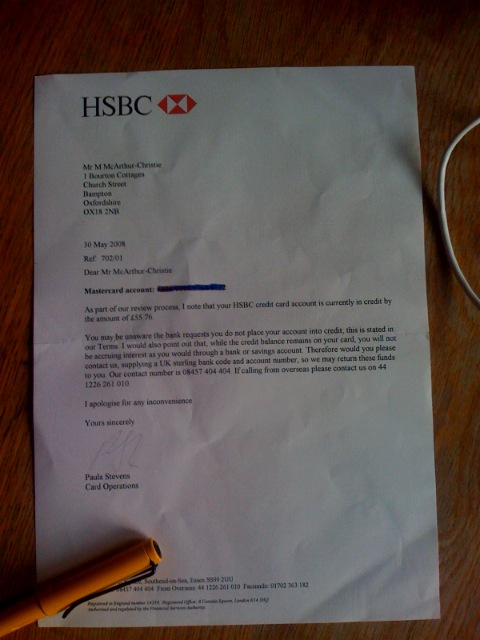A while ago, I was amazed to get a letter from my bank telling me I was in credit on my credit card. I came across it in an old file today – and it’s just as I remembered.
It was from a real person – Paula Stevens from Card Operations. But it didn’t really sound like she’d written it. Instead, it had that slightly remote, finger-wagging, milk-monitorish tone that banks sometimes unintentionally adopt.
It was also a bit convoluted:
“You may be unaware the bank requests you do not place your account into credit; this is stated in our Terms.”
I particularly liked the capitalisation of “Terms” – they must be ever so important if they need a capital letter. I also liked the implication of “You may be unaware…” – it’s always good to call your customers ‘unaware’; goes down well.
Instead, how about something like this:
“We’ve noticed you’ve overpaid your credit card account. Please call us and we’ll transfer your money to your bank account – or you could use it to start a cash or equity ISA with us…”
Simple. Easy. Understandable. And even an attempt to sell the customer something. Hell, why not?
But it got better…
“Therefore would you please contact us, supplying a UK sterling bank code and account number, so we may return these funds to you.”
I’m sure that Paula Stevens from Card Operations doesn’t speak like this. I’ll bet she’s good fun, enjoys a laugh, uses the word “money” more often than “funds” and would never call a customer “unaware” (although I’ll bet she thinks a lot of us are utter morons – and fair game, we probably are).
Why sounding ‘professional’ is a disaster
It’s not Paula’s fault. Somewhere along the line, someone’s told her she needs to sound ‘professional’. In most businesses, that means sounding a bit like a cross between a robot and a traffic policeman. Replacing short, everyday words with long ones. Using too many of them. Nailing them together in sentences that stretch off into the distance with more clauses than Santa’s family.
It’s the difference between being literate and actually communicating. The whole ‘sounding professional’ thing is getting in the way of being understood. It’s no good being literate but ending up with stuff that communicates about as well as a page of Linear B.
The corporate process doesn’t help either. Paula drafts a letter and it all makes sense. It goes to her manager, who changes a few things, rewrites a paragraph and sends it on to her manager in turn. She does the same thing. Then the letter goes to the Compliance and Risk department. They add in the various bits of required FCA wording – word for word – and change a few more things.
How professional is it when the poor old customer has a gnat’s chance of understanding the end result?
I know enough customer services teams to know that they’re not like this. They give a big fat damn about their customers and doing right by them. The customer service advisors who’ve come in on Christmas Day – off shift – to fix problems. The ones who’ve got into their own cars after work, driven forms to customers’ houses and helped them complete them – on their own time. Most people go into customer services because they’re interested in helping customers.
So – here’s a challenge… There are so many brilliant customer services people behind the bars of that opaque, jargon-ridden, convolutedly structured, difficult language. It’s time they escaped. I’ve started the first tunnel – who’s with me?
